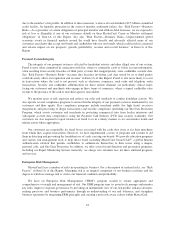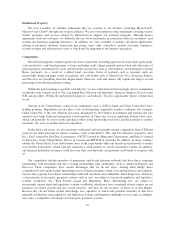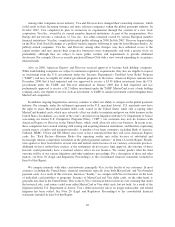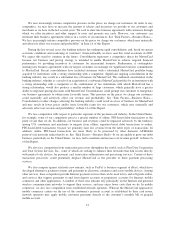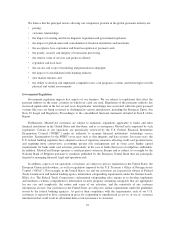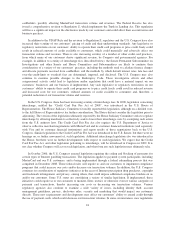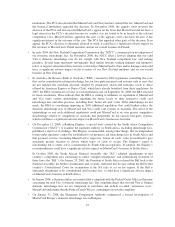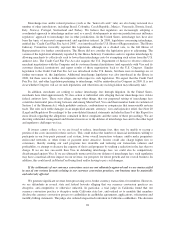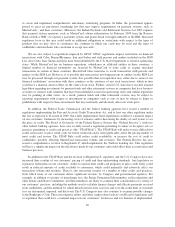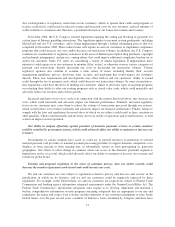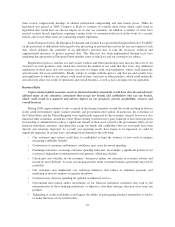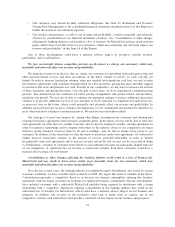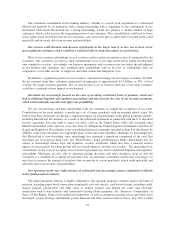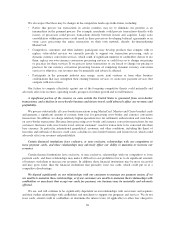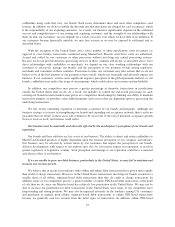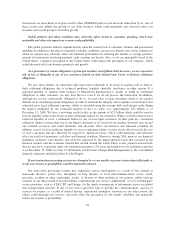MasterCard 2008 Annual Report Download - page 38
Download and view the complete annual report
Please find page 38 of the 2008 MasterCard annual report below. You can navigate through the pages in the report by either clicking on the pages listed below, or by using the keyword search tool below to find specific information within the annual report.Interchange fees and/or related practices (such as the “honor all cards” rule) are also being reviewed in a
number of other jurisdictions, including Brazil, Colombia, Czech Republic, Mexico, Venezuela, Estonia, Israel,
Italy, Norway, Portugal, Switzerland and Turkey. We believe that regulators are increasingly adopting a
coordinated approach to interchange matters and, as a result, developments in any one jurisdiction may influence
regulators’ approach to interchange fees in other jurisdictions. In the United States, interchange fees have also
been the topic of increased congressional and regulatory interest. In 2008, legislation concerning interchange,
entitled the “Credit Card Fair Fee Act of 2008”, was introduced in the U.S. House of Representatives. The House
Judiciary Committee favorably reported this legislation, although on a divided vote, to the full House of
Representatives for further consideration. The House did not consider the legislation prior to adjourning. The
version of the legislation ultimately reported by the House Judiciary Committee seeks to regulate interchange by
allowing merchants to collectively seek to lower their interchange costs by exempting such action from the U.S.
antitrust laws. The Credit Card Fair Fee Act also requires the U.S. Department of Justice to observe collective
merchant negotiations with the Company and its customer financial institutions (and separately with Visa and its
customer financial institutions) and report results of those negotiations back to the U.S. Congress. Similar
legislation to the Credit Card Fair Fee Act was introduced in the U.S. Senate, but there were no hearings on, or
further movement of, the legislation. Additional interchange legislation was also introduced in the House in
2008, but there were no further developments with respect to such legislation. We expect that the Credit Card
Fair Fee Act, and other legislation pertaining to interchange, will be reintroduced in Congress in 2009. It is not
clear whether Congress will act on such legislation, and what form any such legislation may ultimately take.
In addition, merchants are seeking to reduce interchange fees through litigation. In the United States,
merchants have filed approximately 50 class-action or individual suits alleging that our interchange fees violate
federal antitrust laws. These suits allege, among other things, that our purported setting of interchange fees
constitutes horizontal price-fixing between and among MasterCard, Visa and their member banks in violation of
Section 1 of the Sherman Act, which prohibits contracts, combinations or conspiracies that unreasonably restrain
trade. The suits seek treble damages in an unspecified amount, attorneys’ fees and injunctive relief. See Note 20
(Legal and Regulatory Proceedings) to the consolidated financial statements included in Item 8 of this Report for
more details regarding the allegations contained in these complaints and the status of these proceedings. We are
devoting substantial management and financial resources to the defense of interchange fees and to the other legal
and regulatory challenges we face.
If issuers cannot collect, or we are forced to reduce, interchange fees, they may be unable to recoup a
portion of the costs incurred for their services. This could reduce the number of financial institutions willing to
participate in our four-party payment card system, lower overall transaction volumes, and/or make proprietary
end-to-end networks or other forms of payment more attractive. Issuers could also charge higher fees to
consumers, thereby making our card programs less desirable and reducing our transaction volumes and
profitability, or attempt to decrease the expense of their card programs by seeking a reduction in the fees that we
charge. If we are less successful than Visa in defending interchange fees, we could also be competitively
disadvantaged against Visa. If we are ultimately unsuccessful in our defense of interchange fees, such regulation
may have a material adverse impact on our revenue, our prospects for future growth and our overall business. In
addition, this could result in MasterCard being fined and/or having to pay civil damages.
If the settlements of our currency conversion cases are not ultimately approved and we are unsuccessful
in any of our various lawsuits relating to our currency conversion practices, our business may be materially
and adversely affected.
We generate significant revenue from processing cross-border currency transactions for members. However,
we are defendants in several state and federal lawsuits alleging that our currency conversion practices are
deceptive, anti-competitive or otherwise unlawful. In particular, a trial judge in California found that our
currency conversion practice is deceptive under California state law, and ordered us to mandate that members
disclose the currency conversion process to cardholders in cardholder agreements, applications, solicitations and
monthly billing statements. The judge also ordered unspecified restitution to California cardholders. The decision
28


